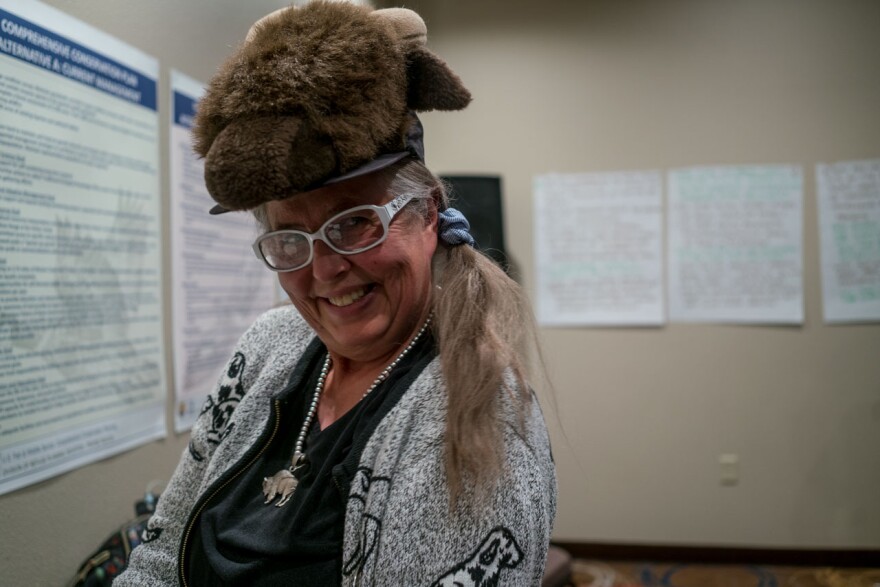The latest step in a years-long process laying out the future of the National Bison Range Monday night dredged up questions of race and public land ownership that have lingered since a failed 2016 proposal to transfer the refuge to the Confederated Salish and Kootenai Tribes.
In 2016, the U.S. Fish and Wildlife Service, which manages the Bison Range said it supported a bill drafted by the CSKT to transfer the refuge from the Service to federal trust ownership for the tribes.
That drew a lawsuit from a group called Public Employees for Environmental Responsibility. It claimed the government and tribes didn’t do enough environmental assessment of the proposal. Shortly after that, then-Secretary of the Interior Ryan Zinke reversed the Fish and Wildlife Service’s endorsement of surrendering management of the Range to the tribes.
Last March, the CSKT reiterated their 25-year ask in a formal request to the Department of the Interior and Montana’s congressional delegation. But the Fish and Wildlife Service isn’t changing course.
This week the Service is holding meetings on its draft 15-year Comprehensive Conservation Plan for the Range. The management plan only slightly tweaks the status quo, maintaining a collaborative role for the tribes, increasing focus on ecosystem management and adding a few more staff.
The meeting Wednesday night in Polson drew about 17 people who had the opportunity to ask questions about and comment on the federal government’s plans for continued management of the range.
"This is the 900-pound gorilla in the room that nobody wants to acknowledge," said John Marshall of Hot Springs. "What do we still have? We still have one of the largest monuments in the United States about the racism and bigotry against Native Americans since this country began."
The refuge is surrounded on all sides by the Flathead Reservation. It was founded in 1908 under legislation that allowed the parcelling out of lands on reservations across the country, without input from the tribes.
Michael D’Agostino, a public affairs specialist with the Fish and Wildlife Service, confirmed that transferring management to the tribes is no longer on the table.
"The current administration is taking the management of the National Bison Range in a different direction than the previous administration had," D'Agostino said. "But we’re continuing to work closely with all of our partners, including the CSKT."

Hunting book author Susan Reneau, a plaintiff in the 2016 lawsuit against tribal management, offered comment at the meeting.
"I really don’t care which group or which individual is trying to encroach on the management and the funding of a federal public land," she said. "I don’t want them to get their grubby hands on it."
Reneau says tribes don’t have the same accountability to all Americans as the federal government, despite tribal claims that, given ownership, they’d maintain public access and manage for the health of the ecosystem and bison population.
"Every refuge that is in the National Wildlife Refuge system would fall to some sovereign Indian government if this is allowed to happen," Reneau says.
But CSKT tribal attorney Brian Upton says that argument is a red herring.
"There aren’t any other situations on reservations in this country that resemble the National Bison Range, including the fact that this land was taken unconstitutionally from the tribes without their consent," he says.
The federal government contends the land transfer was legal.
The back-and-forth over transferring the range back to the tribes has stirred up strong emotions in the area, along with anti-Indian sentiment. Rich Janssen is the head of the Department of Natural Resources for the CSKT. I talked with him over the phone last month.
"The roadblocks, I think, are a lot of misinformation," he said. "You know, a lot of misinformation. We looked at what we did a few years ago and the open forums that we had and the racial overtones that were in those comments. It was incredible."
Many of those comments on the transfer said Native Americans were unable to properly manage the range. One comment called members of the CSKT "lazy bastards." It was a common thread. Many others characterized the tribes as entitled or in need of assimilation.
"You know, I was just flabbergasted," Janssen said.

Tribal attorney Brian Upton says the U.S. Fish and Wildlife Service’s proposal for continued management of the refuge isn’t the end of the road for a transfer to the tribes.
"The tribes continue to believe that restoring the land of the Bison Range to federal trust ownership for the tribes is ultimately the best solution. In the interim, you know, we’re supportive of the Service trying to take the steps they need to take to come up with a management plan like they’re required to do."
Wednesday night’s meeting followed one in Missoula Tuesday, and a third was scheduled for Thursday night at the refuge’s visitor center in Charlo. Public comment on the Fish and Wildlife Service’s plan goes until May 20.
--
Send comments to:
Or mail written comments to:
National Bison Range
Comprehensive Conservation Plan
Attn: Bernardo Garza, Planning
P.O. Box 25486
Denver, CO 80225-0486
Tel 303-236-4377; 303-236-4792


